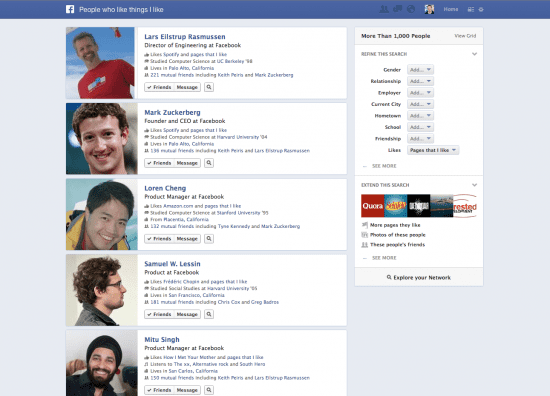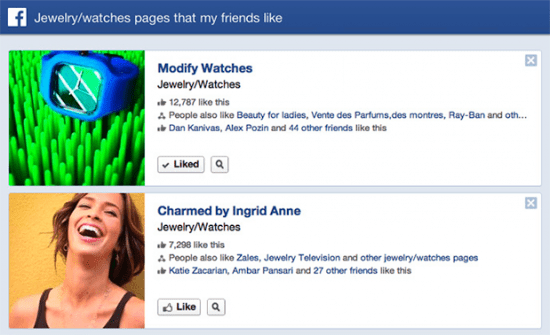A briefing on the opportunities and limitations of Graph Search to prepare businesses for Facebook’s new breakthrough social search tool
 By Carlton Jefferis
By Carlton Jefferis
You will have been hard-pushed to avoid news this week that Facebook launched Graph Search, a major new feature which Mark Zuckerburg hailed “the third pillar of Facebook” after News Feed and Timeline.
This overview introduces the basics of Graph Search and looks at what it could mean to digital marketers and businesses. Over the coming weeks I’ll cover this feature in more detail as further information emerges from Facebook and from those with early access to the US beta release.
What is a Facebook Graph Search?
Graph Search is not a competitor to Google as some of the newspaper headlines may suggest. Instead it's a completely new concept in performing a search on Facebook. It’s not about finding links to web pages based on keywords. Instead it provides answers to natural language questions based on an individual’s map of connections or ‘graph’ as it has become known. It’s a contextual search tool that will begin by offering four new dimensions beyond the keyword - people, photos, places, and interests. Examples of things you could ask Graph Search might be:
- People: “friends who live in my city,” “people from my hometown who like hiking,” “friends of friends who have been to the Lake District,” “digital marketers who live in London and like wine," “People who worked at Google who now work at Facebook “ "people who like things I like," "people who like tennis and live nearby"
- Photos: “photos I like,” “photos of my family,” “photos of my friends before 1999,” "photos of my friends taken in New York," “photos of the Eiffel Tower”
- Places: “restaurants in Bristol,” “cities visited by my family,” "Indian restaurants liked by my friends from India," “tourist attractions in Italy visited by my friends,” “restaurants in New York liked by chefs," "countries my friends have visited"
- Interests: “music my friends like,” “movies liked by people who like movies I like,” "languages my friends speak," “strategy games played by friends of my friends,” "movies liked by people who are film directors," "books read by CMOs"
These prompts from the Facebook search bar suggest the types of searches that will be possible.

The really interesting aspect here is that every person will see a completely different set of Graph Search results, unlike typical web searches which return broadly similar (though not identical) sets of results to everyone. The feature still provides an additional layer of web search results powered by Facebook’s Bing integration but this seems unchanged from the current Bing feature.
Privacy concerns?
With every new Facebook feature come the usual privacy concerns, although on this occasion they seem to have really addressed privacy up-front.
The data in Graph Search results comes from all the interactions – primarily a user’s Likes and About section in Timeline – plus those of your friends and, where privacy settings permit, your wider connections such as friends of friends and anything that is set to Public. The last bucket in that list – Public – includes Facebook Pages and Facebook Apps (although not app ‘Actions’ yet – see below).

When you begin to really think about this powerful new feature it doesn’t take too long to spot the potential – and significant – risk to Facebook that Graph Search becomes the straw that broke the camel’s back in terms of user privacy. People may find it creepy or unsettling when they realise they can be quickly and easily found in searches for “single women who live near me”, for instance. This would undoubtedly drive people to tighten up their privacy and become more mindful about what they share and with whom they share it. No bad thing, but if people rush to close the privacy door this will undermine the core value proposition of Graph Search. Facebook walks a privacy tightrope, as ever.
Graph Search Known Limitations
To explain what Facebook Graph Search offers marketers it's useful to say what it doesn't offer. Here are the clarifications as I see them.
It’s not an improvement to Facebook's on-site search
What Graph Search does not do, which will perhaps disappoint many who hoped for an improved general Facebook search function, is provide any easier way of locating that useful tidbit of content that you recall spotting somewhere on Facebook months ago but can’t remember where. Facebook makes it impossibly (and in my view, unacceptably) difficult to find that stuff and nothing has changed there, yet.
There's no mobile version yet
A significant limitation of the beta release is the lack of any mobile support for Graph Search which means it’s useless when out and about. However, the Nearby feature launched last month – which works on mobile only – will plug that gap for now. Nearby is a useful feature in case you haven’t already spotted it. Mobile support of Graph Search is promised before long.
It Excludes Open Graph Actions
The stories published to Ticker, Timeline and News Feed when you perform an action in an App (such a listen to a track or read an article) are known as Open Graph Actions or just Actions for short. These actions provide rich data about users’ behaviours and interests such as music played, recipes cooked, products wanted, routes cycled. All this data currently falls outside Graph Search results though it’s clear to see that it will be incorporated in a future release.
There's no API
There’s no API (application programming interface) for Graph Search at present so it’s difficult to build apps that fully leverage the data and capabilities although the existing Graph API has allowed developers access to some level of this data for years. At the launch event Zuckerburg committed to provide an API before long.
No new ad unit
Facebook have not launched any new ad unit along with Graph Search. For now Sponsored Results remain the route for brands to buy their way into Graph Search results if they want to reach a wider audience though it surely won’t be long before new ad units are released.
No current availability
As mentioned, this is a limited beta release for now and currently accessible to a relatively small number of US English users although you can get a flavour of the feature from some of the sample searches Facebook provide on the launch page.
There's also no word on when this will hit the UK, Europe or Australasia, in fact no timetable at all. But I would expect the UK market to be pretty near top of the list for release once they have fixed any glitches and nailed the user experience. After all, the UK is home to the only Facebook Engineering team outside the US.
How businesses should prepare

Graph Search results include Facebook Pages, Apps, Places and Groups so it’s important for Facebook marketers and businesses to take action now that will help drive discovery of your Facebook activity in preparation for when the feature is more widely rolled out.
For certain businesses, such as restaurants, there will be some significant opportunities to drive customers not just to your Page but actually to your business.
Here’s a simple checklist for marketers get ready for Graph Search:
- 1. Check your Page and business name, category, vanity URL, and information you share in the “About” section of your Timeline. This helps people find your business and is what appears in Graph Search results.
- 2. If you have a location or a local Place Page, make sure you provide your full address so your Page appears when someone is searching for a specific location.
- 3. Focus on attracting the right fans to your Page and on giving your fans a reason to interact with your content on an ongoing basis.
- 4. Join the Beta via the link at the top of this article - but you will need to be based in the US
- 5. Above all, keep posting timely, relevant and valuable content on your Page as this will continue to drive engagement and reach. For advice and tips take a look at the Smart Insights Smarter Facebook Marketing Guide by Marie Page.

Thanks to
Carlton Jefferis for sharing their advice and opinions in this post. Carlton is founder and CEO of
Gettus!, a tech start-up developing a user-pull social marketing platform. He also consults on social business and digital marketing. Prior to Gettus! Carlton’s career spans 18 years building and scaling pioneering consumer Internet, mobile and digital projects for a diverse range of businesses including financial services, retail and digital media. You can follow him on
Twitter or connect on
LinkedIn.






 Thanks to
Thanks to 

